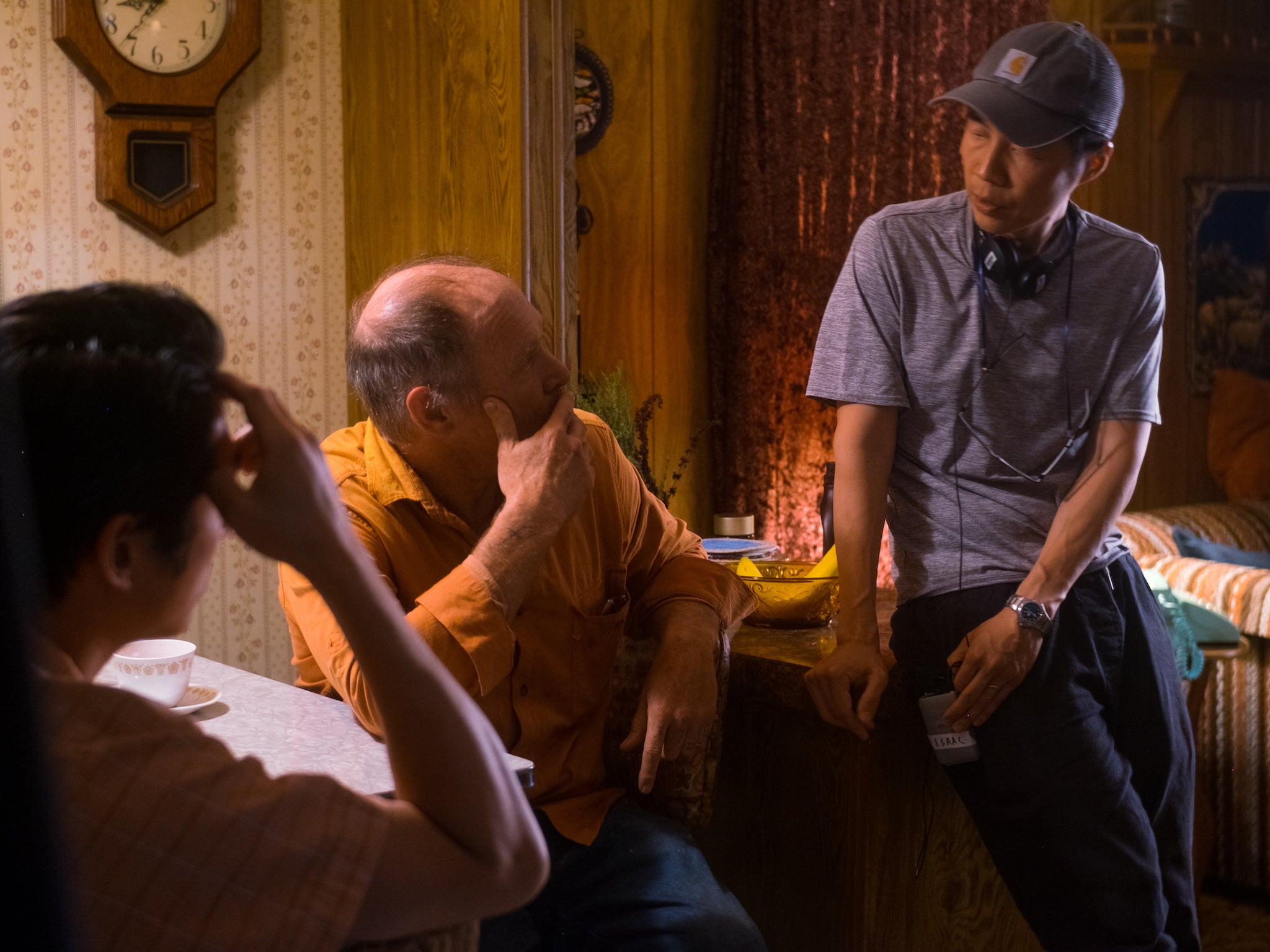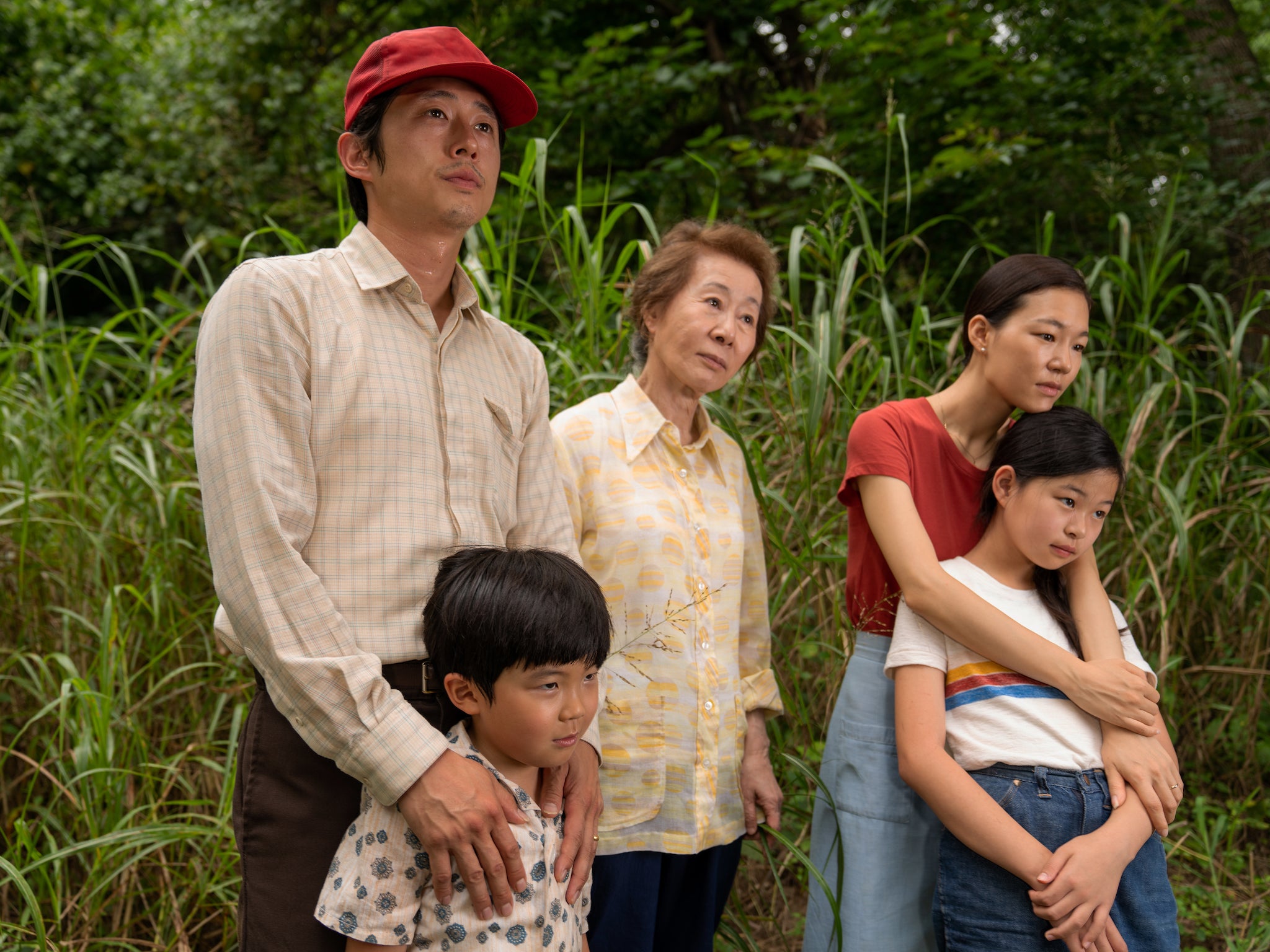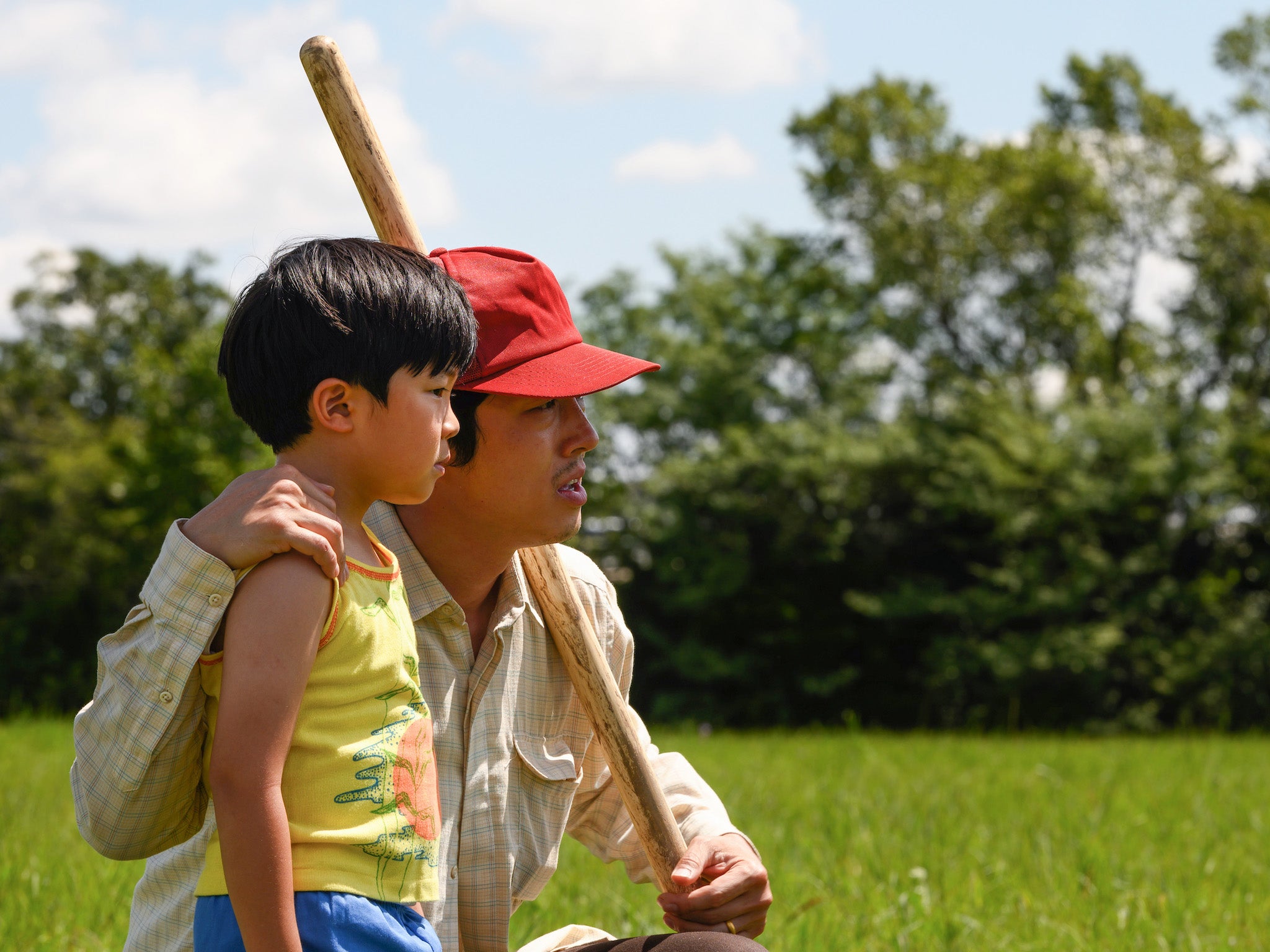Minari director Lee Isaac Chung: ‘We can’t rely on institutions or awards to make progress for us’
The Sundance-winning film has been Oscar nominated but was ruled out of the best picture running in the Golden Globes and Baftas because it’s in Korean. Its director talks to Annabel Nugent about feeling ‘that collective Asian-American groan’, while the star Steven Yeun explains why there was no need to explain race in the film


Your support helps us to tell the story
From reproductive rights to climate change to Big Tech, The Independent is on the ground when the story is developing. Whether it's investigating the financials of Elon Musk's pro-Trump PAC or producing our latest documentary, 'The A Word', which shines a light on the American women fighting for reproductive rights, we know how important it is to parse out the facts from the messaging.
At such a critical moment in US history, we need reporters on the ground. Your donation allows us to keep sending journalists to speak to both sides of the story.
The Independent is trusted by Americans across the entire political spectrum. And unlike many other quality news outlets, we choose not to lock Americans out of our reporting and analysis with paywalls. We believe quality journalism should be available to everyone, paid for by those who can afford it.
Your support makes all the difference.In Minari, a young Korean couple work as chicken sexers in Arkansas. They sit in the dark beneath an overhead lamp, handling hundreds of yellow chirping cotton balls daily, flipping them upside down and based on what they see, sorting them into two plastic crates. Red or blue; girl or boy. It is mundane work, the film’s writer and director Lee Isaac Chung knows that. “Who would want to watch a film about farmers who are chicken sexers?” he asks earnestly. A film that many audiences will have to watch with subtitles. Chung smiles in the knowledge that the answer to his question is in fact: a lot of people.
When Minari took home the Grand Jury Prize at Sundance last year, the awards season carousel jump-started beneath the filmmaker’s feet and it hasn’t stopped since. In the hours before we speak, Minari is nominated for six Baftas. In the days after, it will pick up six more nods – this time for the Oscars. Over Zoom, Chung is quietly ecstatic. There is a pervasive calm to his voice that rarely deviates in octave. But underneath it is the fizzing satisfaction of hard-earned, though unexpected, success.
Awards were never the plan. They weren’t even the goal. Minari began as a “creative exercise” in 2018, says Chung, who at the time had already decided to ditch filmmaking and take up a professorship at the University of Utah’s South Korean campus in Incheon. His rapturously received first feature – the 2007 drama Munyurangabo, set in Rwanda 15 years after the genocide and shot when he was still in his twenties – appeared to be a flash-in-the-pan. He had become deflated. His follow-up features Lucky Life (2010) and Abigail Harm (2012) were more avant-garde and less well known.
“One afternoon, I began writing down childhood memories and after a couple hours I was floored to see that I had a list of about 80.” Some – like needing to be lifted up by his father to enter their new home on wheels, a yellow single-wide trailer that resembles a slab of butter – appear to have been siphoned straight from Chung’s brain to his movie set as if by magic. Or rather, as he explains, by a sharp-sighted production designer with a knack for colour matching old photographs.
Minari tells the story of a South Korean-American immigrant family through the eyes of seven-year-old David (played by Alan Kim and modelled on Chung himself). Sick of working as a chicken sexer, the patriarch Jacob (whose pioneering zeal is underscored by a muted rage in Steven Yeun’s performance) moves the family from the city to the heartlands of Eighties Arkansas where he plans to build a big farm and sell produce to the Korean immigrants arriving in the US. Monica, his wife (an astoundingly subtle Yeri Han), is anxious about the expensive endeavour. She’s also homesick – if not for South Korea, then at least the Asian bubble of Los Angeles in which she had previously been ensconced.

Chung, now 42, recalls how the memory-writing exercise came about. He had been one of 10 or 15 kids from his rural high school in Arkansas to go to college, but when he got there (Yale) realised that he was “a terrible writer” and found himself trumped by prep school kids. “For many years, I was trying to catch up and fit in a little bit more with that New York artsy intellectual space,” he says. Chung modelled his follow-ups to Munyurangabo on arthouse cinema, eschewing his rural background in doing so. He forgot about the Ozark meadow where, as a child, he threw rocks at snakes by the creek and the long Sundays he spent listening to the uplifting harmonies of Christian popstar Michael W Smith in the cafeteria of his small-town church.
When Chung’s memories eventually resurfaced, he held off on telling his family about the film. “My parents are very private, and I didn’t want to be swayed from doing this project, so I just didn’t tell them,” he says. When the film got financed and was picked up for production, that’s when Chung “started to really feel the fear”. He laughs recalling his sister’s reaction when he first told her (“Yeah, they’re gonna kill you”). When he finally plucked up the courage to tell his mum and dad, he acted so “stressed and awkward” about it that they thought he was writing an exposé on all their worst moments. The reality is far from it. “After they watched the film, they said I captured the beauty of what we went through,” he says. “It moved me to tears when they put it that way, because that’s what I was hoping for.”
Reading the premise of Minari – an Asian family moves into an overwhelmingly white town in the rural South – I had my guard up for scenes of racism. Even in their most authentic and meaningful iterations, they are emotionally taxing to watch. But while there are moments of racial discomfort – in one scene, a child at church asks David why his face is “so flat” (something that happened to Chung as a boy) – they are fleeting. In Minari, characters have qualities and concerns more noteworthy than their minority status. Identity politics play second fiddle to a more intimate story of a family, who happen to be Asian immigrants, learning to love one another and build a home.
“This just isn’t a film about race,” says Chung. “The family aren’t thinking about those external judgements day-to-day. They have more pressing concerns.” He laughs and gestures to the camera with an open palm, “I mean I’m sure you feel it too – you don’t wake up thinking about how people perceive your Asianness every day.” He’s right. I don’t.
For Yeun, the film’s Oscar-nominated lead, Chung’s script together with the majority Korean cast and crew “felt like 100 pounds off”, he tells me over Zoom. He exhales deeply, raising and collapsing his shoulders to illustrate his point. The actor has starred in movies by Korean directors Bong Joon Ho (Okja) and Lee Chang-dong (Burning) but is best known among Western audiences as “the hot Asian guy” in AMC’s hit zombie show The Walking Dead. He was also the only Asian guy period.
Shooting Minari “felt like there was this whole weight that I didn’t have to manage,” he says. “There was such a shared understanding between us all that there was no need to explain race.” Shedding this obligation to unpack “what it means to be Asian-American” in relation to whiteness allowed the characters to meet as fathers and children, husbands and wives. “Those, to me, are the connections that are accessible to everybody,” says Yeun. More than portraying an “authentic Asian-American experience”, Chung was concerned with getting the minutiae of farming life right, so as to not be heckled by his friends back home in the South.
The film’s intergenerational dynamics are magnified when Monica’s mother Soon-ja (awry and foulmouthed Young Yuh-jung) arrives from South Korea to help look after the two children who rebel against her foreignness. David especially resents his new bunk buddy – her herbal medicines, her scent (“she smells like Korea!”) and excessive consumption of his favourite Mountain Dew soda. Youn, a doyenne of South Korean cinema and TV, is irresistible as Soon-ja. Everyone on set called her “Old Foxy Lady”. At 73 years old, she is up for her first Oscar nomination. The role was inspired by Chung’s own grandmother but Youn’s portrayal is crucially not limited by his memories; “To all our grandmothers,” reads Minari’s closing dedication.

When speaking about his own halmeoni (Korean for grandmother), Chung appears to wilt. He takes long pauses as if to gather himself silently and casts his eyes downwards where his earphone wires dangle near his collar. His family ended up “alright” in the end. His dad started a business in herbal medicine and his mum became the fastest chicken sexer in Northwest Arkansas; Chung and his sister both attended university and went on to pursue good careers. “It’s my grandmother who never got to see any of that. She left everything in Korea to come and watch us. She had no interest in becoming American, she just knew my mum was having a hard time,” he says. “She died when I was 16 and I just think no history books, nothing is ever going to talk about my grandmother. She was kind of invisible. She couldn’t speak English so didn’t have many friends. I think of her any time I think of the word sacrifice.”
I tell him that those on-screen moments between Soon-ja and David were the hardest to watch because David’s initial rejection of her tapped into a well of guilt I carry about my own late popo (Cantonese for grandma), for my adolescent indifference to building a loving relationship with her. He nods. “There’s a lot of regret that I have about not showing my proper gratitude to my grandmother. There are fictional moments in the movie, the scene of David running after Soon-ja and holding her hand didn’t happen, but that was my way of reckoning with the past and wanting to speak into what I wish I had done.” He takes a brief pause before looking upwards and offering a comforting word, “But your popo, I’m sure she loves you and is totally understanding because that’s what grandparents are like, they’re so loving.”

Last month’s Golden Globes saw thousands of people come to Minari’s defence after it was declared ineligible for Best Picture presumably because it is in Korean – 2009’s winner Inglourious Basterds though, also did not meet the 50 per cent English language requirement. Now, Minari has found itself in the same predicament with the Baftas. “It does fill me with anxiety in some sense because I feel that collective Asian-American groan over it,” says Chung. A groan that constitutes not only the flurry of tweets that protested the decision at the time, but also the implicit look he and I share discussing it now, as if to say: “Can you believe this s***?”
But, he adds, “it seems like there are a lot of allies who are questioning this and saying, ‘Isn’t this categorisation a little bit arbitrary? Aren’t we sort of beyond it at this point?’ And I just feel like we can’t rely on institutions or awards to really make progress for us.” While what Chung says is true, it is still a small triumph that an award as musty as the Oscars has recognised Minari in the Best Picture category. Maybe future so-called “foreign” films will be seen that way, too.
Minari’s five-week shoot got the filmmaker feeling nostalgic. On the first day of filming, he and Yeun drove around his old town and went to the farm where he grew up. “We started talking about buying a place out there together, actually living there,” he grins excitedly. Although the pair’s real-estate dreams were shattered by a gruelling shoot featuring a broken AC unit, lots of ticks and too many snakes, and Chung has moved on to an adaptation of the Japanese anime blockbuster Your Name, as well as writing a Utah-set rom-com, he plans to return for his 25th high school reunion later this year. “It’s time to go back.”
Watch Minari at home from 2 April on minari.film



Join our commenting forum
Join thought-provoking conversations, follow other Independent readers and see their replies
Comments